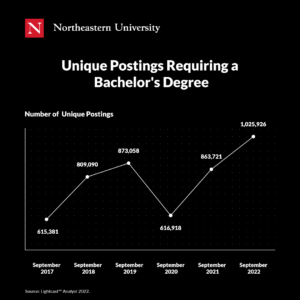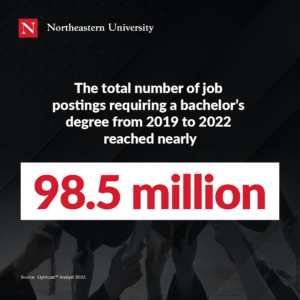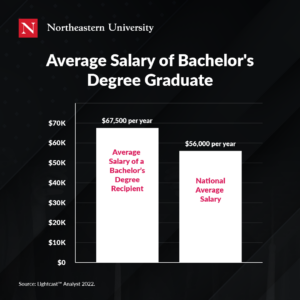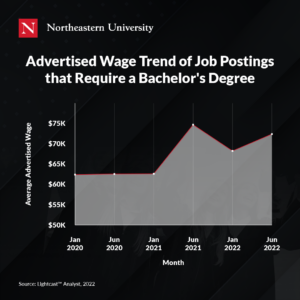Obtaining your bachelor’s degree used to be a way for students to stand out from others in a highly competitive job market. In the last five years, however, the number of job postings requiring the minimum of a bachelor’s degree has increased significantly. This new standard shows that job applicants having a bachelor’s or an even higher education are becoming more common.

Does this mean that a bachelor’s degree doesn’t have value? Is it even important in today’s world of start-up entrepreneurs and self-employed business owners? Is it a worthwhile investment considering that student loan debt may be involved?
The answer, ultimately, is that it really depends on you. Your unique life goals, including your career aspirations, will determine if the bachelor’s degree is a good fit.
Is College Necessary for a Successful Future?
A common question people tend to ask themselves when deciding whether or not to pursue a college degree is, “Can I succeed without college?”
This question is based on the various stories of Bill Gates, Steve Jobs, and other successful business owners who did not acquire their college degrees. However, these experiences are the exception and not the rule, bringing into question if acquiring a degree is worth the investment for the majority of people.
To make this decision, it is important to know what you envision for your future career, the range of skills you would need to succeed, and the life experiences you would need to get there. The combination of all of these elements will inform whether or not time in college would benefit your professional journey.
If your ideal career cannot be pursued without some sort of higher education, there is little doubt that a college degree will provide the necessary resources to succeed in that chosen profession. As mentioned above, the amount of people with a bachelor’s degree or higher has significantly increased, making a bachelor’s more of a necessity. This is why, for many people, earning a college degree is important to their success in today’s job market.
Let’s look at the benefits of earning a bachelor’s degree, and how your personal educational goals and lifestyle choices should be considered in making this major decision.
1. Increased Access to Job Opportunities
Having a bachelor’s degree opens up rewarding opportunities that might have otherwise been inaccessible. For example, college graduates see 57 percent more job opportunities than non-graduates. A degree enables you to qualify for these additional opportunities and offers you more flexibility in where you choose to work.
Not only are there more jobs available to degree holders than high school graduates, but the existing jobs are also more accessible. According to a government report focused on job market analytics, the total number of job postings requiring a bachelor’s degree from 2019 to 2022 reached nearly 98.5 million.

For job seekers, these online job postings are a primary tool for finding and applying to available roles. While more than 80 percent of all job openings for workers with a bachelor’s degree or higher are advertised online, only 50 percent of jobs requiring a high school diploma are posted online, making it harder for these workers to connect with prospective employers.
Pursuing a college education also expands your access to opportunities by connecting you to a lifelong network of colleagues, advisors, professors, and mentors. Over the course of your career, this network can open doors and connect you to industry leaders with whom you can share ideas and explore new ventures.
2. Preparation for a Specialized Career
As the world changes, the job market changes with it. Technology, education, and health are three of the most rapidly growing fields for a good reason; they evolve so often that only the most accomplished individuals can do the work. Getting a bachelor’s degree will help you learn the specific skills and habits needed to make a living in these areas.
While not all degrees offer a direct route to a particular job (English, philosophy, or political science, for example), many are created with a specific career path in mind. An educational degree, for example, is designed as a funnel for teaching jobs; some health degrees also have very specialized jobs waiting at the end for those who complete them.
3. Increased Marketability
Having a bachelor’s degree will keep you in demand as the need for skilled, college-educated workers continues to rise.
Over 80 percent of jobs in four of the fastest-growing occupations—healthcare, STEM, education, and government services—demand postsecondary education.
On your path to earning a bachelor’s degree, you’ll gain skills that will give you a competitive advantage in the job market. Today’s employers are most interested in applicants with exceptional communication, leadership, critical thinking, problem-solving, and analytical skills.
In college, you’ll have access to rigorous coursework and experiential learning opportunities that will arm you with these skills to make you more attractive to employers.
4. Increased Earning Potential
There is plenty of data that suggests college graduate majors can expect their starting salaries to increase over time, giving them hope for their future earnings. The greater your level of education, the higher you can expect your salary to be.
According to government data, the average salary of a bachelor’s degree recipient is $67,500 per year. With the current national average just below $56,000 per year, individuals with a bachelor’s degree are rewarded with higher earning potential as compared to high school diploma and associate degree recipients.

This trajectory of bachelor’s degree graduates has been on an upward trend as well. According to that same government report, from 2020 to 2022 the average median salary of individuals with a bachelor’s degree increased by nearly 20 percent.

5. Economic Stability
Of the 11.6 million jobs created since 2010, over 8.4 million jobs—95 percent—have gone to bachelor’s degree holders. Meanwhile, jobs for high school graduates have only grown by 80,000. It makes sense, then, that bachelor’s degree holders have a significantly lower rate of unemployment than high school graduates. As of 2022, the unemployment rate for those older than 25 with bachelor’s degrees is 1.9 percent, while over 3.6 percent of high school graduates in that age range remain unemployed.
Consequently, individuals without a degree are three times more likely to be living in poverty. According to Pew Research Center, only six percent of bachelor’s degree holders live below the poverty line, while an alarming 22 percent of people without a college degree live in poverty. Earning a bachelor’s degree will help afford you economic stability and security for the future.
6. Networking Opportunities
In today’s job market, building and maintaining a professional network is critical to success. Certain aspects of getting a degree, from interning to volunteering, are designed to help you meet people who can help design your future.
Taking advantage of the various job fairs and career development resources that college students have available is a great way to put that degree to work, as well.

When you get ready to finish your degree and head out into the world, degree earners can expect a level of support from their mentors and professors that isn’t available anywhere else.
7. A Pathway to Advancement
Have you considered a career as a physical therapist, head librarian, or nurse anesthetist? These popular jobs usually require a bachelor’s degree as the first step before going on to get another, more-advanced degree.
You’ll also need a bachelor’s before any Master’s or PhD, as well as the ever-popular MBA. Even if you’re not sure you’re up for the entire career path, earning a bachelor’s degree now puts you in the driver’s seat should you decide to pursue it later.
8. Personal Growth and Improved Self-Esteem
If you aren’t looking for the type of career that often comes from a four-year education, you may be questioning the value of a bachelor’s degree.
There’s more to it than the paper, however; many students have found the experience to be deeply and personally rewarding, as well. In addition to gaining skills like writing, time-management, and working on a team, there are opportunities to polish presentation skills and interact with professors and students who will, later on, become part of your valuable career network.
Earning a degree is empowering; it boosts confidence and provides a sense of achievement. The pursuit of higher education also equips you to master complex challenges and overcome adversity, contributing to increased happiness and reduced stress. This may be why bachelor’s degree holders report higher levels of self-esteem than high school graduates.
College graduates are also more likely to be involved in their communities. Compared to non-degree holders, they are more likely to vote, volunteer, donate to charities, join community organizations, and participate in educational activities with their children. As more active citizens, bachelor’s degree holders contribute to a stronger, more engaged community to provide opportunities for future generations.
9. Higher Job Satisfaction
Research shows that having a bachelor’s degree leads to greater long-term job satisfaction. The differences between degree and non-degree holders are stark:
- Eighty-six percent of college graduates consider their job a career or a stepping stone to their career, while only 57 percent of high school graduates say the same.
- The majority of bachelor’s degree holders—60 percent—say they are highly satisfied and their job is more than just a paycheck. Only 38 percent of degree holders report the same level of satisfaction.
- Forty-two percent of high school graduates say their job is “just to get them by,” compared to 14 percent of bachelor’s degree holders.
Bachelor’s degree holders also enjoy more on-the-job perks that contribute to a sense of career satisfaction. In fact, 52 percent of full-time workers with a degree were offered retirement benefits, compared to only 43 percent of individuals without a degree.
10. Positive Return on Investment
The cost of a degree may be daunting, especially with many students on the news sharing student loan woes and not feeling like the job market is friendly to their specific degree. While no one can argue that some degrees aren’t that easy to employ, many college grads are finding the ROI of a bachelor’s degree to be positive.
Young adults express that their degrees are a good value, with 72 percent believing that their degree has paid off, and an additional 17 percent believing that it will very soon. This trend stays steady among those who borrowed for school, as well. Plus, there are many programs available to help pay for higher education; scholarships, grants and tuition reimbursement programs are all designed to help students avoid debt.
Using a Bachelor’s Degree to Your Advantage
Whether you are looking for more upward mobility in your career, a new opportunity to learn and grow professionally, or a better life for your family through a higher annual salary, the reasons for exploring a bachelor’s degree program are many.
In today’s market, the cost of not having a college degree is rising, as non-graduates face a lack of job options and increased economic instability.
While earning a bachelor’s degree is a big commitment, the rewards are plentiful and within your reach. A brighter economic future, more career possibilities, and a greater sense of personal fulfillment are all possible with the acquisition of a bachelor’s degree.
Take the next step and request information on earning your bachelor’s degree today.
